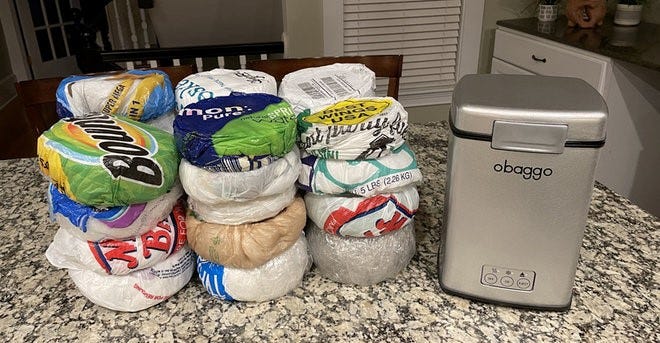Obaggo densifier for polyethylene bags and films sees favorable results from Indiegogo crowdfunding, consumers, MRFs, and upcycler Trex.
January 12, 2022
David New had a problem-solving way to optimize the recycling of flexible packaging for consumers, specifically polyethylene (PE, #2) bags, films, and other packaging materials that qualify for store drop-off recycling. It also assists operations downstream.
“The problem with PE bags and other types of films and flexible packaging is that they are bulky, take up a lot of storage, and are generally uneconomical to collect and reprocess,” he explains. “Densification of the bags can help in a lot of different situations.”
That’s why he invented the Obaggo countertop appliance that densifies — using controlled heat and pressure — about 25 grocery bags and other PE materials into a convenient 3-ounce disk. New believes his invention represents the new shape in consumer-driven recycling.
We interviewed New back in October when the Obaggo crowdsourcing project was getting underway.
How do things stand now three months later, did Obaggo take off as he’d hoped?
The answer is a resounding yes. Below are the six positive updates New shared with us.
1. Indiegogo crowdfunding project raised more than $100,000.
“That was our goal, which should be enough to accomplish our objective: to begin production of the units and get Obaggo devices into consumers’ hands so that they can start to divert plastic bag and packaging film into the recycling stream,” says New.
“We were limited by our advertising budget in what we could accomplish, as funds raised are always in direct proportion to advertising dollars spent, but I was highly encouraged that we hit our goal, keeping expenses within our budget.”
2. Obaggo remains on track to ship the made-in-the US appliance by November.
“Obaggo appliances are still for sale on the Indiegogo platform for $249, through what’s known as the ‘InDemand’ program,” says New. “Units purchased will be shipped just in time for Christmas 2022. And we are excited that we will most likely be manufacturing the devices domestically, rather than overseas.”
3. Encouraging input from Trex, one of the largest users of recycled flexible plastics packaging in the US.
“An Obaggo crowdfunding backer reached out to Trex via their corporate contact link, asking if they could put the plastic pucks in the Trex retail store bins,” New points out. “It was kicked around inside Trex, eventually making it to Dave Heglas, who heads up the recycling side of the business. Because he was familiar with our project, he had his team reply to the backer that the pucks were fine for their store-drop program for polyethylene grocery bags and other flexible PE films and packaging. They are essentially the same materials they use, just in a slightly different form.
“Once the appliance is shipped and (hopefully) getting good reviews, I plan to work with Trex for a formal statement regarding accepting Obaggo disks. But for now, I am comfortable telling my backers that they can use the retail store drop-off locations if that is their most convenient option.
“Our goal is to provide a more convenient alternative to retail store take-back than bundles of voluminous bags.”

4. Positive news from Municipal Recycling Facilities.
“We got some good media attention during the campaign, and recycling companies of all sorts from around the country reached out to inquire about our project,” he reports. “Several Material Recovery Facilities (MRFs) provided the encouraging news that they could and would accept Obaggo disks in their curbside programs on Day-One.
“This is our ‘Holy Grail’: to offer curbside recycling convenience to Obaggo users. However, with more than 300 MRFs in the US alone, we have a long way to go.”
5. Favorable feedback from consumers at home and abroad.
“In addition to the response from companies within the industry, we have received many kind words of encouragement from people all over the country,” he says. “And recycling-minded individuals from all over the world who have told us about their local recycling challenges have expressed interest in distributing the product within their countries. All very positive confirmation that we are heading in the right direction.”
6. Most Obaggo backers are enrolled in an Pilot Test program in Maine.
“We will be providing shipping labels so Obaggo users can ship their disks to us for recycling,” New explains. “Our plan is to aggregate this material and have it reprocessed into post-consumer resin at a regional plastic recycling facility. Then we’ll evaluate the material for manufacturing applications and identify material quality and levels of contamination. This will help future purchasers of Obaggo disks understand the commodity they are purchasing.”
You May Also Like


